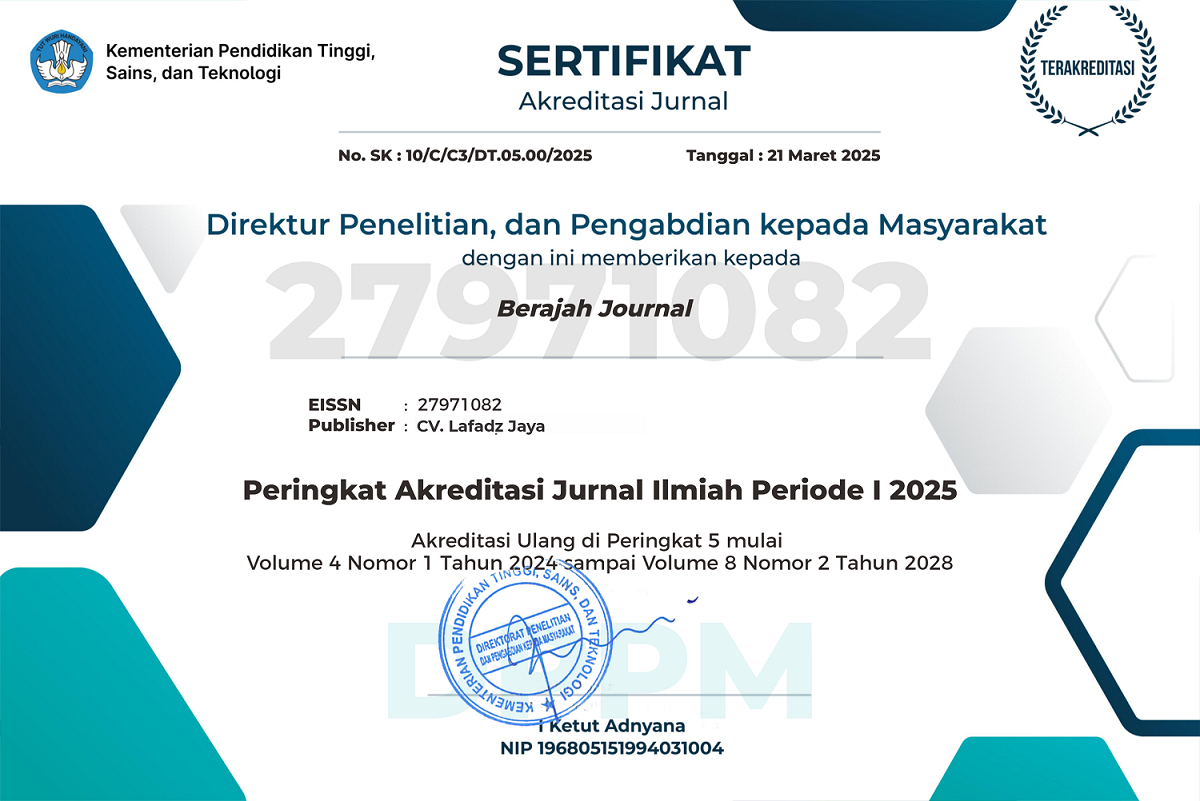SHARIA CAPITAL MARKET LITERACY IN EDUCATIONAL INSTITUTIONS IN TADIKA AL FIKH ORCHARD MALAYSIA
DOI:
https://doi.org/10.47353/bj.v4i1.278Keywords:
Islamic Financial Literacy, Islamic Capital Market, Islamic Economic Principles, Education Staff Training, Tadika Al Fikh OrchardAbstract
This program is a community service initiative that aims to improve staff understanding and skills in the principles of Islamic economics and Islamic capital markets. Conducted at Tadika Al Fikh Orchard, an early childhood education institution in Malaysia, the program targets teaching and management staff to strengthen Islamic financial literacy. The activity will occur from 3 to August 8, 2023, involving 40 participants led by Puan Hj. Siti Ruzita Ramli, Chairman of Tadika Al Fikh Orchard.This activity explores the effectiveness of training programs that include lessons on Islamic mutual funds, stocks, Sukuk, and other Islamic financial instruments. Program implementation methods include identifying partner problems, conducting interactive training, and evaluation through pre-test, post-test, and questionnaire. The program results showed a significant improvement in participants' understanding of Islamic capital markets, as evidenced by an increase in average scores from pre-test to post-test. The evaluation showed that the training improved the understanding and practical application of Islamic economic principles and capital markets. The implications of this program are broad, enhancing individual capabilities and positively impacting Islamic financial education in the context of educational institutions and the wider community.
Downloads
References
Bahri S, A., Mahmadah Hanafi, S., Markarma, A., & Megandani, A. (2022). SHARIA FINANCIAL LITERATURE IN PROMOTING RELIGIOUS MODERATION IN INDONESIA. Jurnal Lektur Keagamaan, 20(2), 413–444. https://doi.org/10.31291/jlka.v20i2.1091
Gunawan, A., Koto, M., Fadly, B., & Shareza Hafiz, M. (2022). Edukasi Literasi Keuangan Syariah Bagi Warga Muhammadiyah Kota Medan. Jurnal Pengabdian Masyarakat, 4(1). https://doi.org/10.30596/ihsan.v%vi%i.10007
Mufidah, A., Istifadah, I., & Nurul Awaliyah, I. (2022a). Sharia Financial Literacy In Personal Financial Planning. International Social Sciences and Humanities, 1(2), 198–203. https://doi.org/10.32528/issh.v1i2.174
Mufidah, A., Istifadah, I., & Nurul Awaliyah, I. (2022b). Sharia Financial Literacy In Personal Financial Planning. International Social Sciences and Humanities, 1(2), 198–203. https://doi.org/10.32528/issh.v1i2.174
Muhammad Irkham Firdaus, & Mufti Fitiyani. (2022). Shariah Perspective on Investing in Islamic Capital Market: A Qualitative Study. Journal of Islamic Economic and Business Research, 2(1). https://doi.org/10.18196/jiebr.v2i1.45
Noor, M., Nurhayati, Y., & Maulidha. (2023). IMPLEMENTASI PENDIDIKAN LITERASI FINANSIAL ANAK USIA DINI: STUDI KASUS DI PAUD BANJARMASIN. Indonesian Journal of Early Childhood: Jurnal Dunia Anak Usia Dini, 5(1), 69–74. https://doi.org/10.35473/ijec.v5i1.2095
Parhan, M., Taufik Rakhmat, A. T. R., Abyan Ashshidqi, M., Sylvia Dewi, L., Bunga Edelweis, S. L., & Regina Prayoga, F. (2022). ISLAMIC FINANCIAL PLANNING: KONSEP LITERASI KEUANGAN SYARIAH SEBAGAI ALTERNATIF PERENCANAAN FINANSIAL BAGI MAHASISWA. Ekonomi Islam, 13(1), 65–84. https://doi.org/10.22236/jei.v13i1.8417
Puspitasari, D. M., Utami, E. M., & Amaliwiati, L. (2023). Islamic Financial Product Literacy in the New Normal Era. KAIBON ABHINAYA : JURNAL PENGABDIAN MASYARAKAT, 5(2), 116–120. https://doi.org/10.30656/ka.v5i2.5005
Sari, A. J., & Pradesyah, R. (2023). PENGARUH LITERASI KEUANGAN SYARIAH DAN KEPERCAYAAN TERHADAP MINAT MASYARAKAT BANDAR PARKLAND, KLANG SELANGOR, MALAYSIA, MELAKUKAN TRANSAKSI DI BANK ISLAM. Maneggio: Jurnal Ilmiah Magister Manajemen, 6(1). https://doi.org/10.30596/maneggio.v6i1.14783
Tulasmi, Rakhmawati, & Siti Latifah Mubasiroh. (2023). Sharia Financial Literacy for Generation Z. Asian Journal of Community Services, 2(6), 501–510. https://doi.org/10.55927/ajcs.v2i6.4594
Widiawati, W., Ani Nuraini, A. N., & Arif Haryana, A. H. (2023). Analysis of The Effect Of Sharia Financial Technology (Fintech) on Increasing Literacy and Inclusion of Sharia Financial Inclusion of Msmes in Dki Jakarta. Journal of Entrepreneur and Business, 1(1), 14–24. https://doi.org/10.52643/joeb.v1i1.22
Downloads
Published
How to Cite
Issue
Section
License
Copyright (c) 2024 Isra Hayati, Ahmad Afandi, Mitra Sami Gultom

This work is licensed under a Creative Commons Attribution 4.0 International License.






















